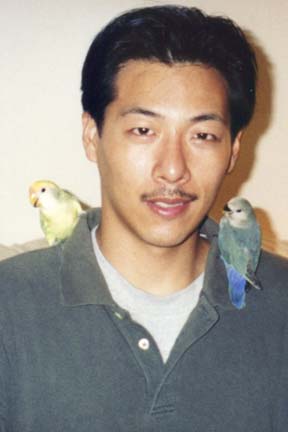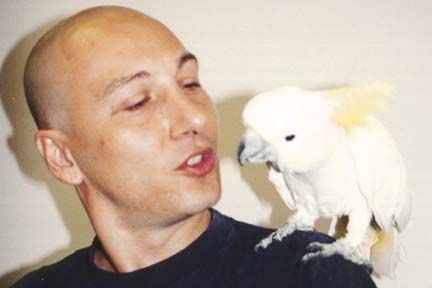
[ PET OHANA ]
HAWAIIAN HUMANE SOCIETY
Neal Chung, an investigator for the Hawaiian Humane Society, plays with his two pet lovebirds.
Pet bird can be
a lifetime friend
With their sociable personalities, birds are among the most popular pets in the world. Because they come in almost any size, color or combination of colors, it's easy to understand why people are attracted to birds as pets.
They are sometimes thought of as "easy" pets, but just like other human and animal members of your family, birds require love and care, mental stimulation and social companionship.
They are intelligent creatures who establish a pecking order for the household and might even come to think of themselves as the "boss" of the family. They can live long lives, making them a wonderful addition to the family for many years. Because they are so sociable and often very smart, wonderful bonds can form between bird and human.
While birds may be tame, they are not domesticated and some still display wild behaviors. Some may scream, bite and engage in displays of dominance. Those who want to share their lives with birds should research the breeds and be prepared for their special behaviors, long life span and the level of care these little beauties require.
The canary and parakeet are usually 5 to 7 inches long and have a life span of six to 10 years, although 20 or more is possible. The cockatiel, originally from Australia, measures 11 to 14 inches long and has a life span of about 14 years, or as many as 40. Bigger parrots and macaws can live up to 80 years.
"While we are known for adopting thousands of dogs and cats at the Hawaiian Humane Society, pet birds are also available for adoption from the shelter," said Pamela Burns, president. "Birds can provide incredibly satisfying companionship. People who love and successfully care for birds are those who have read about the animal, talked to other bird owners and made the commitment to care properly for their pet."
HAWAIIAN HUMANE SOCIETY
Mark Caldeira rescued the cockatoo in 2001 and received an award from the society for his humane effort.
If you need advice or have a health-care question regarding your bird, consult a veterinarian who specializes in the breed. If you can no longer provide the care and attention that your pet requires, bring the bird to the humane society's Incoming Animals desk, open 24 hours daily.
Surrendered birds are health-checked and made available for adoption. It is considered abandonment to let an animal loose, and pet birds are not equipped to survive on their own in the wild. Abandoned birds may suffer from starvation and injury.
Those who are interested in adopting a bird can ask the advice of the humane society's adoption counselors. Birds are housed in cages on the society's lanai near the customer service desk. Discover which type of "birds of a feather" will make your life complete when you flock together.
The adoption hot line might list any birds available for adoption; call 946-2187, ext. 780. Each evening after closing, the message is updated with the pets that will be available the next day.
If you find a lost or abandoned bird, bring it to the humane society's Incoming Animals desk.
"Pet Ohana" runs the first and third Fridays of the month. The Hawaiian Humane Society is a nonprofit agency dedicated to preventing cruelty to animals. They are at 2700 Waialae Ave.
BACK TO TOP |
Lovebirds are smart
and easy to handleNeal Chung says he comes from "a family of bird lovers" and has experience with many types of birds. For those interested in getting a bird as a pet, Chung recommends the parakeet, cockatiel or lovebird because they are intelligent and easy to handle and train.
Lovebirds are featured here because they are often available for adoption at the Hawaiian Humane Society.
Chung says, "Spend time with and show your bird a lot of love, and he will definitely reciprocate!"
Characteristics
Originally from West Africa, vibrantly colored lovebirds are small parrots that are fairly common pets in Hawaii. Peach-faced lovebirds have a bright green body, a vivid red-orange face and throat, and a blue rump. They communicate with a series of chirps and high-pitched squeaks; only a few can mimic the human voice. Chung describes lovebirds as "the comedians of the bird world, very intelligent, curious, energetic and affectionate."
Cages
Lovebird cages should be tall enough to have multiple perches so the birds can fly from one perch to another. Most veterinarians recommend fresh, natural branches as part of the cage furniture. Lovebirds enjoy perching on the branches and peeling the bark from them. Not all wood is safe for birds; use fresh guava branches or get branches from a pet store.Cages also should include toys, especially swings, mirrors and chewable items meant for lovebirds or parrots.
Diet
Ask your veterinarian to recommend a book about your species of bird, and follow the diet specified, usually formulated pellets supplemented with fresh vegetables and other human food.The birds need clean, fresh drinking water and will bathe in a dish that's big enough, so use multiple bowls and clean them each day. They like being misted, too.
Companionship
Though you might think that lovebirds are meant to be in pairs, they don't require a mate. Lovebirds are wonderful single pets and think of their person as their "partner."Once a lovebird has bonded with his human, he will most likely be jealous of a second bird, and, Chung says, "He will let you know about it."
If you want two birds, adopt a pair that are already together.
Outside the cage
Lovebirds can nip or bite and should always be held gently. Unless their wings are clipped, they enjoy flying inside the house. Remember that when the outside door opens, lovebirds can escape and often forget where they call "home."The safest playtime for birds is within an interior room with all doors closed, the ceiling fan and other fans turned off.
Special considerations
Anything with an odor could be a toxin; the fumes generated by cooking with nonstick cookware can quickly kill your lovebird. Chocolate and avocado are very toxic. Avoid feeding your bird fruit seeds, which may contain arsenic.Because they are so intelligent, lovebirds can open their cages; special locks are available to keep the birds safe inside.
Click for online
calendars and events.


